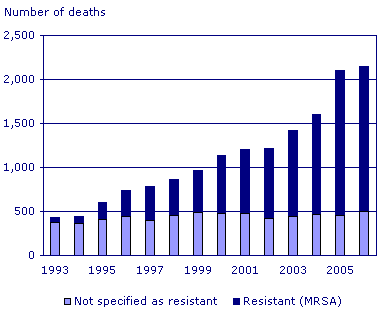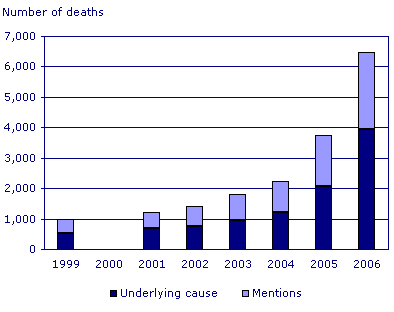As explained by Thomas Hobbes more than three centuries ago, we have to put up with government so it can keep us safe. That's the deal.
Which of course is why government arranges for Torquay's highly dangerous palm trees to be sawn down, why a 150 year old Monkey Puzzle tree (Araucaria araucana) in Swansea faces the chop for having "hypodermic style" needles, and why the scourge of conkers has been forever banished. Yes, when it comes to health and safety, we can all rest easy in the firm knowledge that our ever-vigilant state is protecting us from every danger.
Except that is, for one area - where the government itself is the danger.
Take hospital hygiene. This morning we get news that despite a stream of top-level orders, plus huge expenditure (including £50m+ on that "deep clean"), a quarter of government hospitals remain unsafe:
"The Healthcare Commission reports that no improvement has been made on a year ago. In total, 103 out of 391 trusts admitted they did not achieve the minimum requirements, brought in by the Government to help combat the hospital superbugs, MRSA and Clostridium difficile.
26 per cent of trusts failed to keep facilities clean, did not have adequate infection control or follow guidelines on decontaminating reusable equipment."
Let's just remind ourselves how many people have officially died from MRSA and C difficile in government hospitals:
8,000 in 2006. Compared to around 3,000 deaths in road traffic accidents, and precisely none from entanglements with hypodermic style Monkey Puzzle needles.
Or take the latest shocking revelations on those highly dangerous RAF Nimrods:
"Vital safety features were left out of the design specification for Nimrod surveillance aircraft despite being requested by the Royal Air Force, an inquiry has revealed. Fuel tank explosion protection and a ban on carrying fuel in the fuselage were both listed as “air staff requirements” (ASR) by the RAF. But they were among several items not included in the final design blueprint known as the “aircraft specification”. The RAF’s comments about the design criteria were rejected by the Ministry of Defence when it drew up the specifications for the aircraft."
"Experts" at the MOD deny this dangerous cheeseparing cost the lives of those 14 servicemen in Afghanistan. But then, they would, wouldn't they.
The government routinely accepts safety standards in its own facilities that would not be tolerated in a private sector operation. It is no accident that while NHS hospitals lost those 8000 patients to MRSA and C diff in 2006, in the same year the three main private hospital chains reported not a single confirmed case. And the safety standards applied to its own military aircraft are clearly way short of those it demands for civilian planes.


